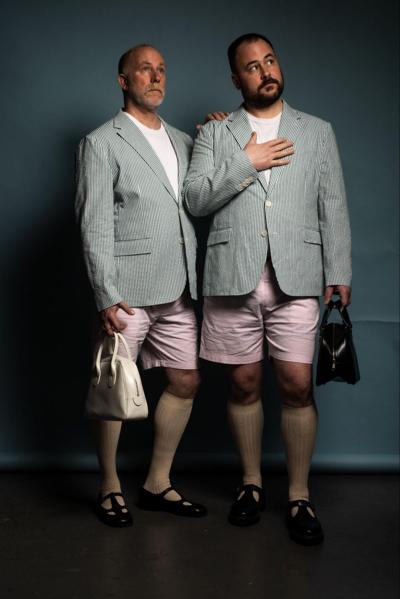
Man on Man's Roddy Bottum and Joey Holman
New York two-piece Man on Man — headlining The Blue Room Friday night — belongs to a lineage of projects by musicians who happen to be gay, but challenge narrow-minded assumptions of what that means sonically. (See also: Hüsker Dü, The Slits, Magnetic Fields, among others.) Roddy Bottum, who turned 60 this month, has lived an illustrious life in and around music beginning in the 1980s with Bay Area experimental metal forebears Faith No More, then the coed ’90s alt-rock combo Imperial Teen. Joey Holman, meanwhile — Bottum's partner, who is 40 — grew up in Georgia and came of age in the Midwestern punk and hardcore community of the turn of the millennium.
Man on Man began as the multi-instrumentalist pair’s quarantine project that became a full-fledged band, and it’s a melting pot of the duo's varied experiences and influences, propelled by the chaos of the world circa 2020. They recently cleared the second-album hurdle with Provincetown, their latest for Illinois' influential Polyvinyl Records. The evocatively-titled 10-song set — an homage to the Cape Cod spring-and-summer bastion for the queer community — is heavy, poppy and unapologetically itself. Ahead of the gig, the Scene caught up with Bottum and Holman as they drove from Cleveland to Philadelphia during a run of shows with Le Tigre, just before they split off to head South on their own.
Please introduce yourselves.
Roddy Bottum: Yes, my name is Rod. I'm a little gayer than Joey.
Joey Holman: I'm Joey. A bit straighter than Roddy, maybe. [Laughs.]
Where did the two of you link up?
RB: In New York City, talking about music on an app. We met, had an undeniable connection, and soon found ourselves thrown into each others' lives intensely. Joey's mom was really sick, he'd gone to Georgia to look after her, and we kept in touch closely. Then, soon after that, COVID happened and our relationship catapulted to a different level of intensity. My mom got really sick too, and in a panic, we drove out to Oxnard, California, from New York to help her. She died, we stayed there dealing with that, the Black Lives Matter movement was going on … it was an intense time. We're both musicians, but hadn't made music together yet, and as a way to get through all this we started writing songs together. That's how Man on Man started.
JH: When we got to the West Coast, we started playing with just an upright piano and acoustic guitar. We wrote this bare-bones song, “Kamikaze.” The next day, Rod wrote “Baby, You're My Everything.” Both were introspective love songs. We tracked them simultaneously. It was a good timestamp for us, to recognize how scary the world was around us, and how we were clinging to each other to get through it. We didn't have plans for a record. We were just writing for each other.
RB: Then we wrote “Daddy.” A different sound for us — driving, energetic, political. That became the sound we led with. There's a 20-year age gap between us, but for both of us — growing up, listening to music — neither one of us ever felt represented. Writing together, we started addressing that lack of visibility of queerness in our rock worlds as kids, and wanted to change that for our own personal trajectories, where we are now … being queer, being loud, living life for ourselves, but also for other people out there who feel the same way.
Being the band you wished had been around when you were growing up?
RB: Yeah, basically. Representing who we are … a world we'd feel comfortable living in.
JH: Truth be told, though, what we do is for right now. A lot of what we see today utilizes its queerness in a way that either makes fun of it, or presents a heightened version of it using metrics like how good they look, or how funny they are. In a lot of reviews Man on Man has been pigeonholed as a “funny” band. But we aren't making fun of ourselves. We're doing what we do because people need to hear from people in 2023 who aren't young, twink-y guys, or are doing drag.
Are there other current bands or artists you consider kindred spirits?
RB: We're on tour with Le Tigre right now. So smart, such a powerful message, such ownership — and though not all the members identify as queer, the message they're sending and the themes they're pushing onstage are so right-on. It's a great environment to be in — it works really well for us. And we've got a lot of friends in NYC talking similar talk that we talk.
JH: Christeene is a strong political queer force in our world. Macy Rodman, who's also in New York. Gal Pal, in L.A... there's room at the table for all kinds of people.
What's some music each of you loved when you were younger that has stayed with you?
RB: That's where that age gap comes into play. [Laughs.] I love loud, repetitive bands … Spiritualized, Spacemen 3, Daft Punk even … bands that are so not queer, but sound-wise, a place I always go.
JH: Mineral, American Football, Bloc Party, Silverchair, Pedro the Lion [and] other bands Roddy's never heard of. [Laughs.] I'm careful to talk about it because I don't want to give any glory to it, but I was in a Christian punk band at one point. I couldn't have been out back then — I would've lost my career, my friend groups, my church, so much of my life. What I'm doing now with my boyfriend onstage right now is so much more who I am.





